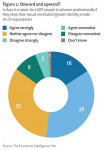Japan is the world’s most innovative country, study finds
The aims of the study were to analyse the importance of innovation, then determine which countries innovate the best and why. To achieve this, the Economist Intelligence Unit compiled the ranking and also conducted a survey of 485 senior executives worldwide on their opinions regarding innovation. Answers from the survey were used to set the weightings for the factors that drive innovation and to examine how and where companies innovate.
Heightened global competition is forcing governments and companies to find new ways to increase productivity, and this is creating renewed interest in the need to innovate. But there is no single, best method to do so. The countries at the top of the ranking are large and small; some value rote learning, while others emphasise spontaneity. All of the leading nations stress the use of government policies to encourage innovation, along with education systems that produce large numbers of scientists and engineers.
“The message for governments is that there is no substitute for good education, nor for policies that encourage investment in IT and communications infrastructure,” says Nigel Holloway, the editor of the report. “For companies, the process of renewal should, if anything, be accelerated. The proportion of total sales from new products and services needs to increase.”
The main findings include:
· Innovation has a beneficial effect on both national economic growth and on corporate performance. The evidence of such benefits is stronger at the microeconomic than at the macroeconomic level.
· Our survey panel cited a broad range of factors to explain what makes a country innovative, with the top determinants being technical skills of the workforce (92% of respondents) and quality of IT/telecommunications infrastructure (also 92%).
· China has more favourable conditions for innovation than India. With annual expenditure of US$136bn on R&D, China now outspends Japan. However, in the sphere of innovation, there is a “small country advantage”: 12 of today’s top 25 countries in our ranking have a population of less than 10 million.
· The return on innovation is estimated to be proportionately higher in middle-income countries such as Mexico and China than among richer countries. This suggests that the former group of economies may be able to catch up with the latter. Although middle-income countries need imported technology, the speed with which they absorb it may depend on their own domestic innovation performance.
· At the corporate level, our survey found that among firms where innovation is identified as critically important, 46% of respondents say their firms perform better than their peers; only 32% of the firms that do not think innovation is critically important perform better than their peers.
· Among respondents who say their firm’s R&D is equal to at least 5% of revenue, 44% say their company performs better than its peers. This compares with 35% among those who say their firm spends less than 5% of revenue on R&D.
· Among firms surveyed that are based in, or are closely connected to, a high-tech cluster such as Silicon Valley, 56% say they performed better than their peers; only 36% of firms outside of a high-tech cluster performed better than their peers.
“It is becoming quite clear that in order to remain competitive, innovation must become a priority at both the national and business level,” said Roger W. Farnsworth, Cisco’s director of Executive Thought Leadership. “Understanding the contributors to and enablers of innovation is critical to success in today's interactions-based economy.”
The report is one of three studies conducted by the Economist Intelligence Unit for Cisco that describe the development of the “interactions” economy, in which customers, suppliers, owners, workers and others go beyond mere transactions to exchange information for mutual benefit. The other two research projects investigate the role of collaboration and personalisation in the interactions economy.
Innovation: Transforming the way business creates
is available free of charge at www.eiu.com/Innovation
Notes for editors:
Innovation: Transforming the way business creates is an Economist Intelligence Unit white paper, sponsored by Cisco Systems. The research is based on an online survey of 485 senior global executives, conducted by the Economist Intelligence Unit in November 2006, as well as an analysis of data from the Economist Intelligence Unit and patent offices in the US, Japan and the EU. Fifty-two percent of the respondents surveyed for this report work for firms that had annual revenue of more than US$500m; 26% are employed by enterprises with revenue in excess of US$5bn.
The Economist Intelligence Unit measured innovation by collating the number of patents per million of population for 82 economies based on data from the three patent offices. Patents was found to be the best proxy for innovation; as in indicator, it correlates well with three other proxies: (a) citations from scientific and technical journals; (b) the average of two ratios: the share of medium- and high-technology products in a country’s manufacturing output and the share of medium- and high-technology exports in its total manufacturing exports, taken from the United Nations Industrial Development Organisation’s Industrial Development Report 2005; (c) the results of a survey question from the World Economic Forum's Global Competitiveness Report 2006 that asked respondents to rate the extent to which companies in 125 countries were adept at, or able to absorb, new technology.
The Economist Intelligence Unit selected a range of innovation drivers, both direct (e.g., R&D as a % of GDP) and indirect (e.g., access to investment finance). These were weighted according to their score derived from the results of the survey. The drivers comprise part of the Economist Intelligence Unit's business environment rankings that predicts how the business climate will change between now and 2011. These predictions were then fed into the innovation rankings to forecast how the league table would change in the next five years.
About the Economist Intelligence Unit
The Economist Intelligence Unit is the business information arm of The Economist Group, publisher of The Economist. Through our global network of more than 700 analysts and contributors, we continuously assess and forecast political, economic and business conditions in 200 countries. As the world's leading provider of country intelligence, we help executives make better business decisions by providing timely, reliable and impartial analysis on worldwide market trends and business strategies.
About Cisco
Cisco is the worldwide leader in networking that transforms how people connect, communicate and collaborate. Since the company’s inception in 1984, Cisco engineers have been leaders in the development of IP-based networking technologies. Today, with more than 47,000 employees worldwide, this tradition of innovation continues with industry-leading products and solutions in the company's core development areas of routing and switching, as well as in advanced technologies such as wireless LAN, unified communications and home networking.
웹사이트: http://www.eiu.com
연락처
Edgar Fernandez
Marketing Manager, Asia-Pacific
(852) 2585 3826 이메일 보내기
Fax: (852) 2802 7007
이 보도자료는 Economist Intelligence Unit가(이) 작성해 뉴스와이어 서비스를 통해 배포한 뉴스입니다.




